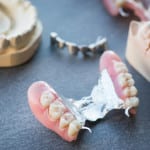
There are many reasons why a person might be missing a tooth or teeth – such as decay, disease or injury – but the general consensus is that it’s not a good look. On anyone.
Of course, missing teeth aren’t only a problem aesthetically. The loss can also affect speech and the ability to eat. Furthermore, with more space than a mouth was designed for other teeth might decide to take advantage of the room and have a wander, meaning remaining teeth shift. In some cases, bone loss can also occur around a missing tooth.
In short, a missing tooth can turn out to be a little problem with big consequences. Thankfully, however, it can be a problem easily fixed.
The main options to replace a lost tooth or teeth tend to be crowns, bridges, dentures and implants.
Crowns and bridges
These are prosthetic devices that can only be removed by a dentist once they’re in. Crowns tend to be porcelain or ceramic ‘caps’ fixed onto damaged teeth or implants and made to match the colour of natural teeth.
Of course, if you prefer a little bling with your pearly whites – or you’re a rap artist from Otley – gold and metal alloys are also an option.
Bridges can also be as natural or outlandish as you like and they pretty much do what they say on the tin. A prosthetic device that spans the space where the teeth are missing, a bridge is cemented onto the natural teeth either side of a gap.
As with crowns, there is a choice of materials for bridges and your dentist can help you decide which would best suit the location of the missing tooth or teeth. By maintaining good oral hygiene, a bridge can last a lifetime.
Dentures
These are removable appliances that restore your smile in an instant if you’ve lost most or all of your teeth. Extensive tooth loss tends to result in sagging facial muscles, so dentures can also take years off you. In some respects it’s the dental equivalent of a facelift.
Conventional dentures are made and positioned once any remaining teeth have been removed. However, they can only be worn once the gums have healed, which could take several months. If this is a concern, some dentures can be inserted on the same day, with corrections made once the jaw has healed.
Another alternative is the overdenture which can be placed over any remaining natural teeth.
If it is only one tooth missing rather than a number of teeth, a partial denture might be the answer. This takes the form of a false tooth attached to a plate, which is clipped into place. As ever, speak with your dentist to find the best option for you and your lifestyle.
Implants
A dental implant is basically a replacement tooth root and it provides the strongest possible foundation for fixed or removable replacement teeth. The implant is a titanium post secured directly in the jaw. The result is a natural look and feel because the implant is designed to fuse with the bone. Unlike bridges, the surrounding teeth remain unaltered by the procedure. Implants can now replace a full set of teeth in a single one-day procedure.
In conclusion, a lost tooth is not the end of the world, or even an end to smiling. Modern dentistry has made it an inconvenience easily fixed. Simply consult your dentist to find the best option to suit your needs.












